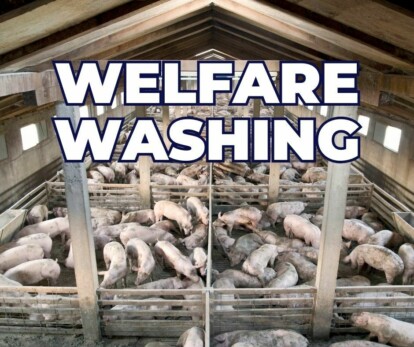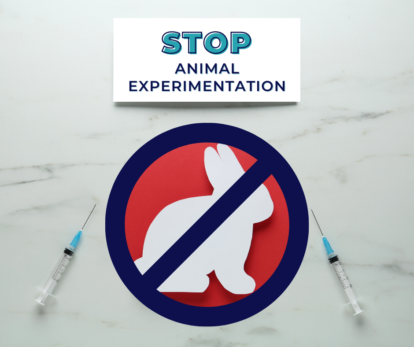Why ‘high welfare’ labels slow the shift to veganism


If you’re a regular reader of the Ethical Globe blog, you’ll have seen our recent articles about why it’s time to end testing on our fellow animals and some of the exciting alternatives to animal testing that are starting to be more widely used.
Right now, many parts of the scientific community still promote experimenting on our animal kin as the gold standard of scientific enquiry, a view that consequently spills into the general population.
In a 2021 survey, 56% of US adults said that medical testing with non-human animals is “morally acceptable”, and 47% said that they support “scientific research with animals”. It’s significant that support for the so-called “humane use of animals in biomedical research” went up to as high as 64% in the US when Dr Fauci stated in a White House briefing that animal experimentation was an essential part of creating the COVID-19 vaccine.
This narrative encourages people to see animal experimentation as a necessary evil, despite the growing evidence about its extensive limitations and inaccuracies.
So, what can we do? How can we stop animal experimentation and encourage governments, health organisations, charities and more to invest in humane alternatives? How can we help to change the narrative?
Here are nine ideas:
There are a number of organisations dedicated to stopping the use of our fellow animals for cosmetic testing and scientific research. We can support these campaigns by volunteering, donating, sharing and more.
You can find more information as a starting point on the following websites:
These are just a few of the prominent organisations working to end animal testing. An internet search will help you to find other campaigns, especially those specific to your country.
A number of high-profile medical charities use some of the funds they raise to pay for scientific research using our animal kin.
UK-based organisation Animal Aid has published a helpful list of health charities detailing whether they do or don’t fund animal testing. You’ll notice from this list that while some charities do not directly use donations for animal experimentation, they are members of the Association of Medical Research Charities (AMRC) and have to agree to “support the principle of using animals in research”.
One thing we can all do is contact those charities that are funding animal-based experiments to register our complaints. We can also donate to charities working towards eradicating the same diseases without animal experimentation.
If you’re unsure whether a charity is funding animal testing, you can contact them to ask for a position statement.
Donations bequeathed in wills are a major source of charity funding, accounting in some cases for up to 50% of funds raised. Sadly, legacy donations are often directed to scientific experiments using our fellow animals. If you are thinking about leaving a donation to a medical research charity in your will, ask for details of their scientific research first.
As a child, were you ever expected to take part in a dissection lesson at school? Many children and young people grow up believing that animal-based research is unavoidable, and this belief starts in the classroom.
If you are aware of classroom dissection in a local school or college, register your complaint with the school. You might also want to highlight research that shows animal experimentation is unreliable and flag up humane alternatives to dissection – for example, SynFrog is a reusable synthetic anatomically-correct dissection model of a frog; there is also a growing range of online dissection software such as Biosphera or Digital Frog International.
Nowadays, many schools have a dissection-choice policy. Even in those that don’t, parents and students can object to taking part in a dissection lesson – the earlier you know about it, the more opportunity you will have to take action.
Animal Learn has a helpful guide to refusing to take part in dissection and helping schools to embrace humane alternatives. Apparently, 86% of students support being offered an alternative to dissection.
Many of the world’s universities play a vital role in driving forward our understanding of illness, disease and treatment. Unfortunately, they often do this with experiments on other animals.
The Oxford Centre for Animal Ethics is creating conversations within academia to challenge animal testing; it concluded in a 2015 report, Normalising the Unthinkable, that animal experimentation needs to be “denormalised” and “deinstitutionalised”, and that it is not morally justifiable.
Currently, scientific institutions – many of which are associated with universities – see experiments on our animal kin as being the way things have always been done and, therefore, what we must continue to do. And yet, research shows that data derived from animal experimentation for six common diseases accurately predicted the human response just 50% of the time. In other words, with a similar degree of accuracy to flipping a coin.
Universities Challenged is a campaign by Animal Aid to highlight UK-based universities that still use animal experimentation. Other organisations may publish similar lists for other countries.
Animal experimentation at universities in the US is heavily underreported because a number of key species used in research (rats, mice, reptiles, amphibians, fish, birds, and invertebrates) are not covered by the federal Animal Welfare Act (AWA).
You can write to universities to complain about their use of experiments on our fellow animals. You might want to direct them to the work being carried out by The Oxford Centre for Animal Ethics.
If you’ve discounted applying to a specific university because of their use of experiments on our animal kin, write to let the university/department know that this was a dealbreaker for you.
News outlets such as television news programmes, newspapers and online news sites help to normalise experiments on our animal kin.
Search for articles about “animal research” on any of the main news websites, and you’ll see stories about research using non-human animals that are heralded as “groundbreaking”, “exciting”, “innovative”, “valuable for research”, and so on. Even when ethical concerns are raised, they’re often minimised in some way (for example, a researcher “does not believe they are problems today”).
A study published in 2020 – “Clinical impact of high-profile animal-based research reported in the UK national press” (Jarrod Bailey, Michael Balls) – looked at 27 unique scientific ‘breakthroughs’ that were reported in the press in 1995. Twenty-five years later, how many of those breakthroughs have resulted in human benefits? The answer was just one. Twenty of the so-called breakthroughs had ended as failures, three were inconclusive, and three were partially successful.
However, the wider public would only ever have heard about the ‘breakthrough’ and not the long-term outcomes, feeding into the narrative that experimenting on our fellow animals is essential for scientific discovery.
If you see news articles that praise animal experiments in any way, you can write to the editor or site with your complaint.
In the UK, you can also log a complaint with the Independent Press Standards Organisation (IPSO). Similar organisations exist worldwide to help promote accountability in journalism – you might want to start with the Accountable Journalism website for information about who to contact.
Contact your local political representative to highlight your concerns around animal experimentation, including research that shows it is not as reliable as people are generally led to think and information about alternative research methods.
If you’re in the UK, you can find the contact details for your local MP here. Other countries have different local, regional and national sites to put you in touch with political representatives.
Suppose politicians can see that enough people feel strongly about ending scientific experiments on our animal kin. In that case, they may start to advocate for changes in legislation or lend their support to other testing methods.
Throughout the world, various individuals and organisations have created petitions against using our animal kin for scientific research. You can add your name to the petitions and log your reasons for supporting the campaigns, as well as share them with your networks or make a donation.
In the UK, you can find details of all of the open petitions that have been logged with the government at petition.parliament.uk. Other countries may have different ways of sharing petition information.
Whatever your location, you can find petitions listed on sites such as:
Simply use the search facility to find current campaigns against animal experimentation to which you can lend your support. If you can’t see a petition about a specific issue (for example, animal testing happening locally), you can create your own.
Increasingly, scientists are exploring how to conduct safe research using human volunteers. You can help to support this approach by registering to take part in specific clinical trials and studies.
In the UK, you can find out about ways to take part in research via the Be Part of Research website, which also lists UK Research Registries. In the US, you can register to be a research volunteer via organisations such as ResearchMatch or the Institute of Translational Health Sciences. Other countries will have similar sites.
Another option is to approach your local university for details of the human-based clinical studies they’re conducting. Some institutions pay travel expenses or pay volunteers a nominal fee to cover ‘out of pocket’ costs.
As someone who opposes experiments on our animal kin, you can choose to donate your body, organs or tissues to science when you die, leaving a valuable resource.
The first step is to make your loved ones aware of your wishes, which should then be recorded in writing (with witnesses).
If you choose to donate your body to a local university, medical school or biomedical facility, you should ask them for a consent form and for details of their bequeathment service. This needs to be planned well in advance as some institutions may not accept body donations and your relatives cannot consent on your behalf after you have died.
Right now, there is no doubt that experiments on our animal kin are hardwired into scientific practice. Legislation and funding often support or even require animal testing for scientific purposes. The system must be reconstructed at all levels to facilitate research that doesn’t rely on non-human animal subjects.
Attitudes are still entrenched. People are able to separate the animals they love as pets from the animals that live and die in laboratories (something Professor Stephen F Eisenman through The Oxford Centre for Animal Ethics calls “splitting”). Speciesism tells us that human rights override the rights of all other animals – this is why someone can be appalled by a dog being kicked by a human but turn a blind eye to Beagles being force-fed toxins. It’s why, when Switzerland proposed banning animal testing earlier in 2022, 79% of people voted against a ban.
There is hope. More and more scientists are looking for alternatives to tests that use our animal kin as subjects. We need to shine a light on these alternatives and add our voices to those calling to end animal experimentation. The nine actions above are a starting point.